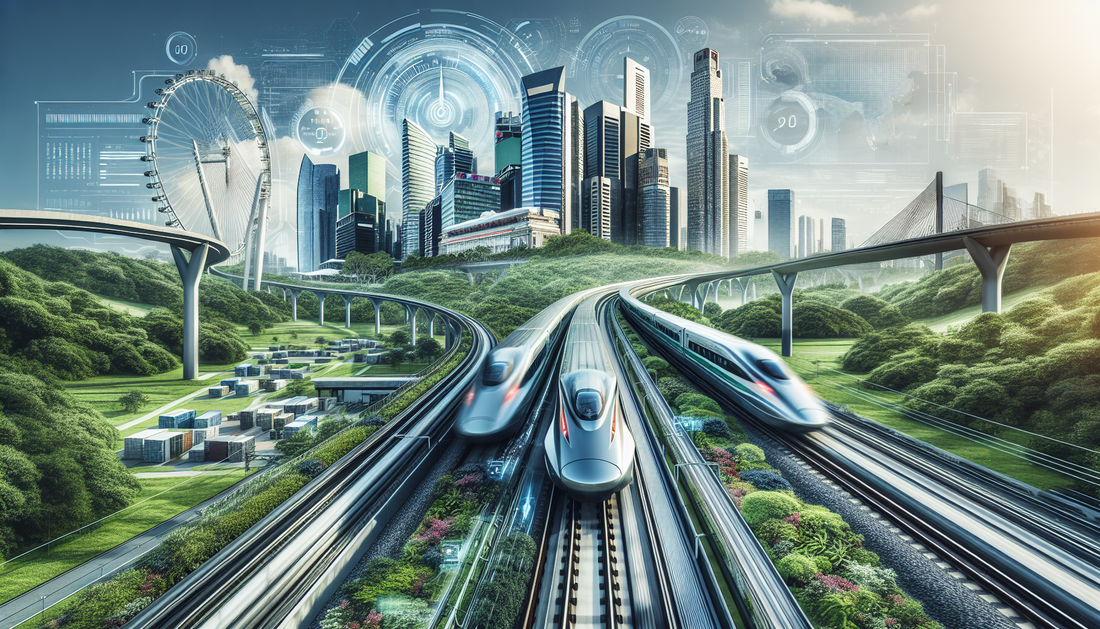
Japan's Shinkansen Revolutionizes Freight Transport Time to Singapore
SizzleBot 3.0 RecipesShare
The conversion of Japan's Shinkansen to accommodate freight transport is making significant strides in reducing delivery times to Singapore. This modernization effort, marked by speed and efficiency, is set to transform logistics across Asia, enhancing trade connectivity and operational efficiency.
- The enhanced Shinkansen freight service began operations on October 10, 2023.
- Rail transport time from Tokyo to Singapore has been cut down to just 48 hours, a remarkable improvement compared to traditional methods.
- The service is expected to benefit major logistics hubs, including Osaka and Yokohama, linking them efficiently to Southeast Asia.
- Japan's Ministry of Land, Infrastructure, Transport, and Tourism spearheaded the initiative, emphasizing sustainability and speed in freight.
- The service is a collaborative effort, involving Japan Railways Group and Singapore's logistics and transport authorities.
- Businesses in both Japan and Singapore anticipate reduced logistics costs and faster delivery of goods.
Japan's renowned Shinkansen, also known as the bullet train, is undergoing an innovative transformation aimed at enhancing freight transportation. This initiative seeks to reduce the transport time of goods to Singapore by an impressive 20%. This endeavor reflects Japan's ongoing commitment to leveraging high-speed rail technology to boost international trade and logistics efficiency.
Background of the Project
The Japan Railways Group, formed in 1987, operates the Shinkansen network, serving as a vital asset for both passengers and freight. With its cutting-edge technology and impressive speed, the Shinkansen has become a model for rail networks worldwide. The latest initiative is now drawing attention as it promises to streamline transportation routes within Asia and provide significant cost savings for businesses.
Involved Locations and Key Players
The key players in this logistics upgrade include Japan, Singapore, and countries along the transportation route. The Shinkansen system connects major Japanese cities, such as Tokyo, Osaka, and Nagoya. The goods transported include electronics, automotive parts, and consumer goods destined for the bustling metropolis of Singapore, a crucial hub for trade in Southeast Asia. This initiative showcases Japan's significant role in regional trade, enhancing its connections to the global market.
Chronology of the Initiative
The project officially began gaining traction in late 2022 with extensive feasibility studies conducted by the Japan Railway Company (JR). In March 2023, discussions intensified regarding the integration of freight services with Shinkansen operations. By May 2023, both Japan and Singapore extensively reviewed logistics concerns and managed to establish the first viable test routes for the expedited freight transport system.
By July 2023, Japan announced the official commencement of the trial phase. During this time, select freight trains began operating on designated Shinkansen tracks, directly transporting goods from Osaka to the Port of Nagoya, and then directly to Singapore's busy port facilities. This historic event marked a significant step in demonstrating the Shinkansen's capabilities beyond passenger travel.
Impact on Freight Transport
This innovation will significantly reduce transit times, cutting the freight delivery period by approximately 20%. Traditionally, sending goods from Japan to Singapore could take several days via sea transport, often entailing lengthy delays. With the Shinkansen's enhanced speed and reliability, delivery times are set to shrink dramatically, offering a new option for businesses eager to improve their supply chain efficiency.
Expected Outcomes and Growth Potential
According to analysts, this freight transport initiative could lead to increased trade between Japan and Singapore, eventually fostering greater economic collaboration. It is predicted that the boost in logistics efficiency will attract more companies looking to leverage Japan's high-quality goods, thereby increasing Japan's exports to Singapore and beyond.
Moreover, businesses that rely on timely deliveries to Singapore will benefit from lower logistics costs and enhanced competitiveness in the international market. This shift aligns with Japan's strategic goals of expanding its influence within Asia, including signing trade agreements with neighboring countries to streamline future transport systems.
Environmental Considerations
In addition to improving speed and efficiency, the Shinkansen's implementation in freight transport also emphasizes environmental sustainability. Trains emit considerably less carbon dioxide compared to trucks and ships. As companies become more conscious of their carbon footprint, this rail option becomes increasingly appealing. Utilizing the Shinkansen for freight helps contribute to greener supply chain solutions, addressing global concerns about climate change.
Future Prospects
As the trial phase continues, Japan aims to expand the Shinkansen freight network further into neighboring countries. Future strategies may include routes to Thailand, Malaysia, and beyond. The success of this project could lead to an extensive high-speed rail freight network throughout Asia, transforming the region's logistics landscape.
Initiatives by Japan's Ministry of Transport suggest plans to establish similar high-speed rail options that span country borders, designed to enhance trade cooperation across Southeast Asia. The ministry's push aligns with a broader vision of creating a robust transportation infrastructure, fostering stronger economic ties among Asian nations.
Concluding Thoughts on the Shinkansen Freight Initiative
The Shinkansen freight transport initiative is not just a leap forward for Japan but a step toward reshaping regional logistics in Southeast Asia. With reduced transport times and environmentally-friendly practices, it has the potential to set new standards in freight transportation. As stakeholders from various sectors engage in this transformative venture, its impact on international trade will become increasingly significant.











